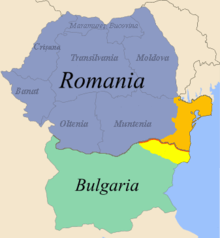Southern Dobruja
Southern Dobruja or South Dobruja (Bulgarian: Южна Добруджа, Yuzhna Dobrudzha or simply Добруджа, Dobrudzha) is an area of northeastern Bulgaria comprising Dobrich and Silistra provinces. It has an area of 7,565 km² and a population of 358,000. When it was a part of Romania, de jure from 1913 to 1918 (de facto from 1913 to 1916) and again from 1919 to 1940, it was known in Romanian as Dobrogea de sud, the Cadrilater ("Quadrilateral"), or Dobrogea Nouă ("New Dobruja").

History
At the beginning of the modern era, Southern Dobruja had a mixed population of Bulgarians and Turks with several smaller minorities, including Gagauz, Crimean Tatars and Romanians. In 1910, of the 282,007 inhabitants of Southern Dobruja, 134,355 (47.6%) were Bulgarians, 106,568 (37.8%) Turks, 12,192 (4.3%) Gypsies, 11,718 (4.1%) Tatars, and 6,484 (2.4%) Romanians.
Southern Dobruja was part of the autonomous Bulgarian principality from 1878 and part of the independent Bulgarian state from 1908 until Bulgaria's defeat in the Second Balkan War, when the region was ceded to Romania under the Treaty of Bucharest (1913).
In 1914, Romania demanded all landowners prove their property and surrender to the Romanian state one third of the land they claimed or pay an equivalent of its value. This was similar to the agrarian reforms in Romania which occurred the previous century, in which the landlords had to give up two-thirds of their land, which was then handed over to the peasants.[1] In Southern Dobruja, many of the peasants who received the land were settlers, including tens of thousands of Aromanians from Macedonia, as well as Romanians from Wallachia, which led to claims that the reforms had a nationalist purpose.[1]
On 7 September 1940 Southern Dobruja was restored to Bulgaria under the Treaty of Craiova. The treaty was followed by a mandatory population exchange: about 110,000 Romanians (almost 95% of whom settled there after 1913) were forced to leave Southern Dobruja, whereas 77,000 Bulgarians had to leave Northern Dobruja. Only a few hundred Romanians and Aromanians are now left in the region.[2]
Demographic history
| Ethnicity | 1910 | 19301[3] | 2001[4] | 2011[5] |
|---|---|---|---|---|
| All | 282,007 | 378,344 | 357,217 | 283,3953 |
| Bulgarian | 134,355 (47.6%) | 143,209 (37.9%) | 248,382 (69.5%) | 192,698 (68%) |
| Turkish | 106,568 (37.8%) | 129,025 (34.1%) | 76,992 (21.6%) | 72,963 (25.75%) |
| Roma | 12,192 (4.3%) | 7,615 (2%) | 25,127 (7%) | 12,163 (4.29%) |
| Tatar | 11,718 (4.2%) | 6,546 (1.7%) | 4,515 (1.3%) | 808 (0.29%) |
| Romanian | 6,348 (2.3%)2 | 77,728 (20.5%) | 591 (0.2%)2 | 947 (0.33%) |
- 1According to the 1926–1938 Romanian administrative division (counties of Durostor and Caliacra), which included a part of today's Romania (chiefly the communes of Ostrov and Lipnița, now part of Constanța County) and excluded a part of today's Bulgaria (parts of General Toshevo and Krushari municipalities)
- 2Including persons counted as Vlachs in Bulgarian Census
- 3Only includes persons who answered the optional question on ethnic identity. The total population was 309,151.
Administrative divisions
Between 1913 and 1940, during the Romanian rule, the region covered two counties: Durostor and Caliacra. Nowadays, the territory of Southern Dobruja forms the provinces of Silistra and Dobrich.
See also
References
- Theodore I. Geshkoff. Balkan Union: A Road to Peace in Southeastern Europe, Columbia University Press, 1940, p. 57
- „Problema Cadrilaterului - diferendum teritorial şi repere imagologice (1913-1940)”, George Ungureanu
- Calculated from results of the 1930 census per county, taken from Mănuilă, Sabin (1939). La Population de la Dobroudja (in French). Bucarest: Institut Central de Statistique. OCLC 1983592.
- Calculated from the results of the 2001 Bulgarian census for the administrative regions of Dobrich and Silistra, from "Население към 01.03.2001 г. по области и етническа група" (in Bulgarian). Националния статистически институт. Retrieved 2007-05-02.
- Calculated from the results of the 2011 Bulgarian census for the administrative regions of Dobrich and Silistra, from "Население по етническа група и майчин език" (in Bulgarian). Националния статистически институт. Retrieved 2015-11-20.